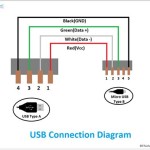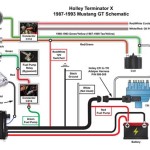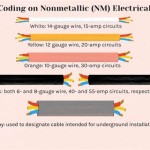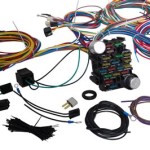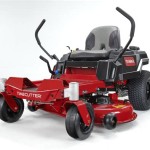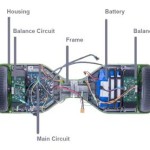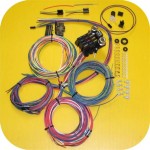Waterproof automotive wiring connectors are electrical connectors designed to withstand harsh environmental conditions, particularly exposure to water. Their primary function is to provide a secure electrical connection while preventing the ingress of moisture, ensuring reliable electrical performance in automotive applications.
These connectors play a vital role in various automotive systems, such as engine management, lighting, and audio. Their waterproof design is crucial in protecting electrical connections from moisture and corrosion, preventing electrical malfunctions and ensuring the safety and reliability of vehicles. One notable historical development in this field was the introduction of automotive-grade sealed connectors, which significantly improved the durability and reliability of electrical connections in harsh environments.
The upcoming sections of this article will explore the different types of waterproof automotive wiring connectors, their design features, the testing and certification standards they must meet, and the specific applications where they are commonly utilized.
Waterproof automotive wiring connectors are essential components in ensuring the reliable and safe operation of vehicles. Their design and performance are influenced by various key aspects, each of which plays a crucial role in meeting the demands of harsh automotive environments.
- Materials: The materials used in the construction of waterproof connectors are critical in determining their durability and resistance to corrosion, moisture, and temperature extremes.
- Sealing: Effective sealing mechanisms prevent the ingress of water and other contaminants, ensuring electrical integrity and preventing short circuits.
- Durability: Waterproof connectors must withstand mechanical stress, vibration, and extreme temperatures without compromising their performance.
- Electrical performance: The connectors must maintain low electrical resistance and high current-carrying capacity to ensure efficient power transmission.
- Mating cycles: The number of mating and unmating cycles that a connector can withstand without degrading its performance is a measure of its durability and reliability.
- Environmental protection: Waterproof connectors must meet industry standards for protection against dust, dirt, and other environmental factors.
- Industry standards: Compliance with automotive industry standards, such as ISO/TS 16949, ensures that connectors meet specific quality and performance requirements.
- Cost-effectiveness: Balancing performance and cost is crucial for the widespread adoption of waterproof connectors in automotive applications.
- Design flexibility: Waterproof connectors come in various shapes, sizes, and configurations to accommodate different design requirements.
- Ease of use: Connectors should be easy to install and maintain, reducing downtime and maintenance costs.
These key aspects are interconnected and influence the overall performance and reliability of waterproof automotive wiring connectors. Understanding and considering these aspects is essential for engineers, designers, and manufacturers involved in the development and implementation of electrical systems in the automotive industry.
Materials
In the context of waterproof automotive wiring connectors, the materials used in their construction play a decisive role in ensuring their ability to withstand the harsh conditions encountered in automotive applications. These connectors are exposed to a range of environmental factors, including moisture, extreme temperatures, vibrations, and chemical contaminants, which can degrade their performance and reliability if not properly protected.
The choice of materials for waterproof connectors is driven by the need to maintain electrical integrity and prevent corrosion. Common materials used include:
- Thermoplastics, such as nylon and PBT, offer good electrical insulation, resistance to moisture and chemicals, and can be molded into various shapes.
- Thermosetting plastics, such as epoxy and polyurethane, provide excellent chemical and temperature resistance, ensuring long-term durability.
- Metals, such as copper and brass, are used for terminals and contacts due to their high electrical conductivity and resistance to corrosion.
- Elastomers, such as rubber and silicone, are used for seals and gaskets to prevent the ingress of moisture and contaminants.
The selection of materials for waterproof automotive wiring connectors is crucial for their performance and reliability. By carefully considering the environmental conditions and the specific requirements of the application, engineers can design connectors that meet the necessary standards for durability, safety, and performance.
Sealing
In the context of waterproof automotive wiring connectors, effective sealing mechanisms are paramount in preventing the ingress of water and other contaminants, ensuring electrical integrity and preventing short circuits. These connectors are designed to operate in harsh automotive environments, where exposure to moisture, dirt, and extreme temperatures is inevitable. Without proper sealing, water and contaminants can penetrate the connector, leading to corrosion, electrical malfunctions, and potential safety hazards.
To achieve effective sealing, waterproof automotive wiring connectors employ various sealing mechanisms, including:
- Gaskets and O-rings: These are rubber or silicone seals that fit between the connector halves, creating a watertight barrier.
- Crimp seals: These are metal or plastic sleeves that are crimped onto the wires, providing a secure and waterproof connection.
- Adhesive seals: These are applied to the connector housing or terminals to fill any gaps and prevent water intrusion.
The choice of sealing mechanism depends on the specific design and application requirements of the connector. By implementing effective sealing measures, waterproof automotive wiring connectors ensure reliable electrical connections, even in the presence of moisture and other contaminants.
Real-life examples of effective sealing in waterproof automotive wiring connectors include:
- Automotive lighting systems, where connectors are exposed to moisture and temperature extremes.
- Engine management systems, where connectors must withstand exposure to fluids and chemicals.
- Audio systems, where connectors need to protect against dust and moisture.
Understanding the importance of effective sealing in waterproof automotive wiring connectors is crucial for engineers and designers involved in the development and implementation of electrical systems in the automotive industry. By incorporating robust sealing mechanisms, they can ensure the reliability and safety of electrical connections in harsh automotive environments.
Durability
Within the broader context of Waterproof Automotive Wiring Connectors, durability is paramount in ensuring reliable and safe operation in harsh automotive environments. Waterproof connectors are subjected to various mechanical, environmental, and thermal stresses that could potentially degrade their performance and compromise the integrity of electrical connections.
- Mechanical Strength: Waterproof connectors must withstand mechanical stress, such as pull-out forces, push-back forces, and torque, without compromising the electrical connection. This ensures secure mating and prevents accidental disconnection due to external forces.
- Vibration Resistance: Automotive environments are characterized by continuous vibrations caused by engine operation, road conditions, and other factors. Waterproof connectors must be designed to withstand these vibrations without experiencing damage or loosening of connections.
- Temperature Extremes: Automotive connectors operate in extreme temperature ranges, from sub-zero temperatures in winter to high temperatures in summer. Waterproof connectors must maintain their performance and reliability across these temperature variations, preventing overheating, melting, or embrittlement of materials.
- Corrosion Resistance: Waterproof connectors are exposed to moisture, road salts, and other corrosive elements. Their materials and sealing mechanisms must be resistant to corrosion to ensure long-term durability and prevent electrical failures.
By considering the various aspects of durability, engineers and designers can develop waterproof automotive wiring connectors that can withstand the rigors of automotive applications, ensuring reliable and safe electrical connections throughout the vehicle’s lifespan.
Electrical performance
Within the broader context of Waterproof Automotive Wiring Connectors, electrical performance plays a vital role in ensuring reliable and efficient operation. Waterproof connectors are designed to maintain low electrical resistance and high current-carrying capacity, enabling efficient power transmission and minimizing power loss.
- Contact Resistance: Contact resistance refers to the electrical resistance between the mating surfaces of the connector. Low contact resistance is crucial for minimizing power loss and preventing overheating at the connection point.
- Current-Carrying Capacity: Waterproof connectors must be able to handle the required current without excessive heating or voltage drop. High current-carrying capacity ensures reliable power delivery to various electrical components.
- Terminal Design: The design of the terminals within the connector influences its electrical performance. Proper terminal design optimizes current flow and minimizes contact resistance.
- Material Selection: The choice of materials for the terminals and contacts is critical for ensuring low electrical resistance and high current-carrying capacity. Conductive materials with low resistivity, such as copper and silver alloys, are commonly used.
By carefully considering these aspects of electrical performance, engineers and designers can develop waterproof automotive wiring connectors that meet the demanding electrical requirements of automotive systems. These connectors ensure efficient power transmission, prevent overheating, and contribute to the overall reliability and performance of the vehicle.
Mating cycles
Within the realm of Waterproof Automotive Wiring Connectors, mating cycles hold immense significance as a measure of durability and reliability. These connectors are designed to withstand repeated mating and unmating operations without compromising their electrical performance.
Durability and reliability are particularly crucial for waterproof automotive wiring connectors due to the harsh and demanding environments they operate in. They are subjected to frequent mating and unmating cycles during vehicle maintenance, repairs, or accessory installations. A connector’s ability to endure these cycles without experiencing wear or damage ensures uninterrupted electrical connections and prevents malfunctioning components.
Real-life examples of mating cycles in waterproof automotive wiring connectors can be found in:
- Engine management systems: Connectors in engine compartments undergo frequent mating and unmating for maintenance and repairs, requiring high mating cycle durability.
- Lighting systems: Headlight and taillight connectors are repeatedly mated and unmated during bulb replacements or electrical troubleshooting.
- Audio systems: Connectors in audio systems experience mating cycles when connecting or disconnecting portable devices or external amplifiers.
Understanding the importance of mating cycles in waterproof automotive wiring connectors helps engineers and designers develop connectors that can withstand the rigors of automotive applications. By incorporating robust designs and using durable materials, they can ensure reliable electrical connections throughout the vehicle’s lifespan, minimizing maintenance costs and enhancing overall vehicle safety.
Environmental protection
Within the comprehensive realm of Waterproof Automotive Wiring Connectors, environmental protection holds paramount importance. These connectors operate in harsh automotive environments, where exposure to dust, dirt, and other contaminants can compromise their performance and reliability. Industry standards have been established to ensure that waterproof connectors meet stringent requirements for protection against these environmental factors.
- Ingress Protection (IP) Ratings: IP ratings are an international standard that classifies the level of protection provided by enclosures against dust and water ingress. Waterproof automotive wiring connectors typically meet IP67 or IP68 ratings, indicating their ability to withstand dust and water immersion.
- Material Selection: The materials used in waterproof connectors play a crucial role in environmental protection. Durable materials, such as high-grade plastics and elastomers, resist degradation caused by UV radiation, ozone, and chemicals.
- Sealing Mechanisms: Effective sealing mechanisms prevent the ingress of contaminants. Waterproof connectors employ gaskets, O-rings, and adhesive seals to create a watertight barrier.
- Testing and Certification: Waterproof connectors undergo rigorous testing to ensure compliance with industry standards. Tests include exposure to dust, dirt, and water under various conditions.
By meeting industry standards for environmental protection, waterproof automotive wiring connectors ensure reliable performance in harsh conditions. They protect against corrosion, electrical malfunctions, and premature failure, contributing to the overall safety and durability of vehicles.
Industry standards
In the realm of Waterproof Automotive Wiring Connectors, compliance with industry standards is of paramount importance. Standards such as ISO/TS 16949 establish stringent quality and performance requirements that connectors must meet to ensure reliability and safety in automotive applications.
- Quality Assurance: ISO/TS 16949 mandates a comprehensive quality management system that governs the entire manufacturing process, from design and development to production and testing. This ensures that waterproof connectors meet high standards of workmanship, materials, and performance.
- Performance Testing: Connectors must undergo rigorous testing to demonstrate their ability to withstand harsh automotive conditions, including exposure to extreme temperatures, vibration, moisture, and corrosion. Compliance with ISO/TS 16949 ensures that connectors meet or exceed specified performance criteria.
- Traceability and Documentation: The standard emphasizes traceability throughout the supply chain, ensuring that each connector can be traced to its origin and manufacturing history. This facilitates quality control, product recalls, and warranty claims.
- Continuous Improvement: ISO/TS 16949 promotes a culture of continuous improvement, requiring manufacturers to regularly review and enhance their processes to maintain compliance and meet evolving industry demands.
By adhering to industry standards like ISO/TS 16949, manufacturers of waterproof automotive wiring connectors demonstrate their commitment to quality and reliability. These standards provide a framework for consistent production and testing, ensuring that connectors meet the demanding requirements of the automotive industry and contribute to the safety and performance of vehicles.
Cost-effectiveness
Cost-effectiveness plays a pivotal role in the widespread adoption of waterproof automotive wiring connectors. Manufacturers must strike a delicate balance between delivering high performance and maintaining competitive costs to ensure the viability and accessibility of these connectors in the automotive industry.
The cost-effectiveness of waterproof automotive wiring connectors is influenced by various factors, including:
- Material selection: The choice of materials for the connector’s housing, terminals, and seals directly impacts its cost. Balancing durability, corrosion resistance, and temperature tolerance with cost is essential.
- Manufacturing process: The complexity of the manufacturing process, including molding, assembly, and testing, affects the overall cost of the connector.
- Volume production: Economies of scale can significantly reduce the cost per unit when connectors are produced in high volumes.
Real-life examples of cost-effective waterproof automotive wiring connectors can be found in:
- Automotive lighting systems: Waterproof connectors are used in headlamps and taillights, where cost-effectiveness is crucial due to the high volume of production.
- Engine management systems: Waterproof connectors in engine compartments must withstand harsh conditions, but cost constraints are also considered.
- Audio systems: Waterproof connectors in car audio systems need to balance performance and cost to meet market demands.
Understanding the principles of cost-effectiveness in waterproof automotive wiring connectors enables engineers and designers to optimize their designs for both performance and affordability. This understanding contributes to the broader goal of making reliable and durable electrical connections accessible in various automotive applications.
Design flexibility
Design flexibility is a crucial aspect of waterproof automotive wiring connectors, enabling them to adapt to diverse applications and meet specific design constraints. This flexibility encompasses a range of factors, including shape, size, and configuration, ensuring that connectors can seamlessly integrate into various electrical systems.
- Modular Design: Waterproof connectors often feature modular designs, allowing for easy assembly and disassembly. This modularity simplifies maintenance, repairs, and upgrades, reducing downtime and increasing system flexibility.
- Compact Size: In space-constrained automotive environments, compact waterproof connectors are essential. They enable designers to optimize packaging density without compromising performance or reliability.
- Custom Configurations: Manufacturers offer customizable connector configurations to meet specific application needs. This customization extends to the number of , pin arrangements, and housing designs, ensuring a tailored fit for each electrical connection.
- Environmental Adaptability: Waterproof connectors are designed to withstand diverse environmental conditions, from extreme temperatures to harsh chemicals. They can be configured to meet the specific IP (Ingress Protection) rating requirements of different automotive applications.
The design flexibility of waterproof automotive wiring connectors empowers engineers and designers to optimize electrical systems for performance, reliability, and cost-effectiveness. By accommodating a wide range of design requirements, these connectors contribute to the overall efficiency and functionality of modern vehicles.
Ease of use
In the realm of Waterproof Automotive Wiring Connectors, ease of use plays a critical role in ensuring efficient installation, maintenance, and repair of electrical systems. Time-consuming and complex connector designs can lead to costly downtime and increased maintenance expenses. Therefore, waterproof automotive wiring connectors are engineered to be user-friendly, reducing installation time and simplifying maintenance procedures.
Real-life examples of ease of use in waterproof automotive wiring connectors include:
- Quick-connect terminals: These terminals allow for fast and convenient wire insertion and removal, minimizing installation time.
- Ergonomic designs: Connectors are designed to fit comfortably in the hand, making them easy to grip and manipulate, even in tight spaces.
- Color-coding and labeling: Clear color-coding and labeling simplify wire identification, reducing the risk of errors during installation and maintenance.
Understanding the importance of ease of use in waterproof automotive wiring connectors empowers engineers, technicians, and mechanics to select and implement connectors that optimize system uptime, reduce maintenance costs, and enhance overall vehicle safety and reliability.










Related Posts

